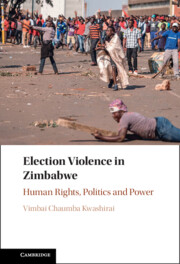Book contents
- Election Violence in Zimbabwe
- Election Violence in Zimbabwe
- Copyright page
- Dedication
- Contents
- Figures
- Tables
- Preface
- Acknowledgements
- Abbreviations
- Introduction
- 1 Violence, a Colonial Curse
- 2 Zanu PF and PF Zapu Violence
- 3 The New Enemy in the 1990 General Elections Was Zum
- 4 Zanu PF on Zanu PF Violence in 1995
- 5 What Presidential Election in 1996?
- 6 The Movement for Democratic Change Was Number One Enemy in 2000
- 7 Presidential Election in 2002
- 8 What General Elections in 2005?
- 9 Disharmony in the 2008 Harmonised Elections
- 10 Violence in the 2013 Elections
- Conclusions
- Recommendations
- Select References
- Index
Introduction
Published online by Cambridge University Press: 23 February 2023
- Election Violence in Zimbabwe
- Election Violence in Zimbabwe
- Copyright page
- Dedication
- Contents
- Figures
- Tables
- Preface
- Acknowledgements
- Abbreviations
- Introduction
- 1 Violence, a Colonial Curse
- 2 Zanu PF and PF Zapu Violence
- 3 The New Enemy in the 1990 General Elections Was Zum
- 4 Zanu PF on Zanu PF Violence in 1995
- 5 What Presidential Election in 1996?
- 6 The Movement for Democratic Change Was Number One Enemy in 2000
- 7 Presidential Election in 2002
- 8 What General Elections in 2005?
- 9 Disharmony in the 2008 Harmonised Elections
- 10 Violence in the 2013 Elections
- Conclusions
- Recommendations
- Select References
- Index
Summary
The problem of election violence is huge and ongoing. The full story on the magnitude of electoral violence in Zimbabwe since 1980 remains untold. A glaring intellectual negligence exists on undertaking such a task to move the research field of electoral practices in modern Zimbabwe forwards. This book pioneers and historicizes long-run election violence in Zimbabwe. It is a descriptive analysis of a sizeable fraction of the millions of incidents of election violence estimated since 1980 to date. Election-related violence, mhirizhonga (in Shona) and udlakela (in Ndebele), is the focus of this book, using a liberal approach that generally and largely allows actors and facts to speak for themselves. The extant violence literature has missed the key argument that violence has been there right from pre-colonial times. In pre-colonial times, ethnic-based violence over access to political power and resources depopulated parts of Zimbabwe. Ending such violence was also a flimsy justification for violent British colonization. Colonialism was itself violence that promoted ethnic differences in order to divide and rule indigenous peoples – a tactic black nationalists embraced during and after Zimbabwe’s liberation war, laying fertile grounds for similar techniques for governance. While Zimbabwe has its unique characteristics, it certainly depicts broader debates about violence and elections in Africa, including those that insidious violence, ethnicity and entrenched weaknesses of opposition parties are readily available electoral instruments of elites to consolidate a stranglehold on power.
- Type
- Chapter
- Information
- Election Violence in ZimbabweHuman Rights, Politics and Power, pp. 1 - 7Publisher: Cambridge University PressPrint publication year: 2023

